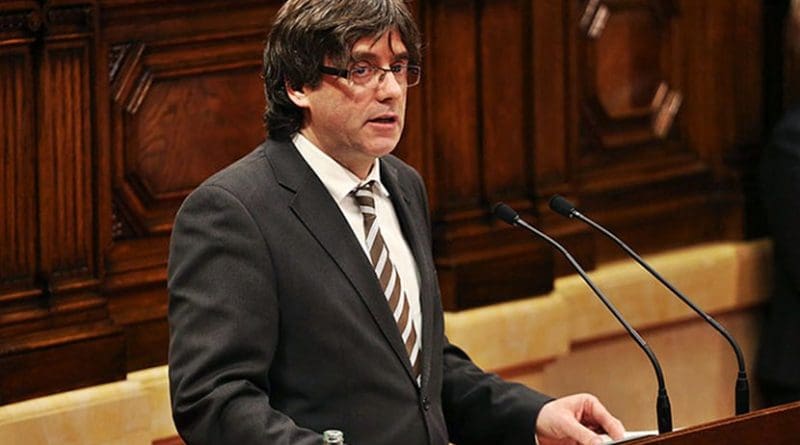Puigdemont Steps Down, Names Successor For Catalonia’s Presidency
By EurActiv
By Ninon Bulckaert
(EurActiv) — Carles Puigdemont, the former president of Catalonia who organised the illegal independence referendum in October 2017, nominated on Thursday (10 May) a pro-independence politician as his successor at the head of Spain’s rebellious region.
The Catalan separatist figurehead fled from Spain to Belgium after Madrid overruled the referendum and charged him with rebellion and is currently in exile in Germany. Spain asked Berlin to extradite him but a court in Schleswig-Holstein refused to do so last month. It argued that he was not involved in violence during the referendum on Catalan independence.
Renouncing the presidency, Puigdemont might be offering Catalonia a chance to form a government after months of political instability and an election in December, but his successor is known to share the same pro-independence agenda.
Joaquim Torra Pla, as known as Quim Torra, is widely seen as Catalonia’s best chance to form a regional government. A former president and publisher of the Catalan pro-independence association Omnium Cultural, he is the first candidate who has not been jailed, exiled or prosecuted in the aftermath of the independence referendum.
Quim Torra, an MP from Puigdemont’s pro-independence party, Together for Catalonia (JxCat), shares the political line of his exiled friend. Known for his anti-Spanish tweets, his radical nationalist stance makes him a worthy successor of Puigdemont.
However, he remains a political novice, since he only entered Catalonia’s parliament in January 2018. Despite this, a majority of separatist MPs should vote for him – except for four MPs from the Popular Unity Candidacy (CUP), a left-wing pro-independence political party, who already declared that they will abstain.
His possible election and the formation of a new Catalan government is a condition set by Madrid to reenact Barcelona’s autonomy – the Spanish government dissolved the Catalan parliament after the referendum, thus using for the first time article 155 of the Constitution, which allows it to do so.
Madrid made it impossible for Puigdemont to hold any office in Catalonia. The Spanish government spokesman Iñigo Méndez de Vigo announced on Wednesday (9 May) that any candidate for the Catalan parliament must be present at the plenary session.
Madrid reacted to Torra’s nomination in a statement, reminding him that he has the “obligation to comply with the law”. Prime Minister Mariano Rajoy told Antena 3 that a “dialogue” will only be possible with a functioning Catalan government, whose formation is now more likely.
Inés Arrimadas, a leader of opposition in the Catalan parliament and member of Ciudadanos, the unionist party, criticised Puigdemont’s choice, arguing that Quim Torra will only continue the climate of “confrontation and social division” in Catalonia.

